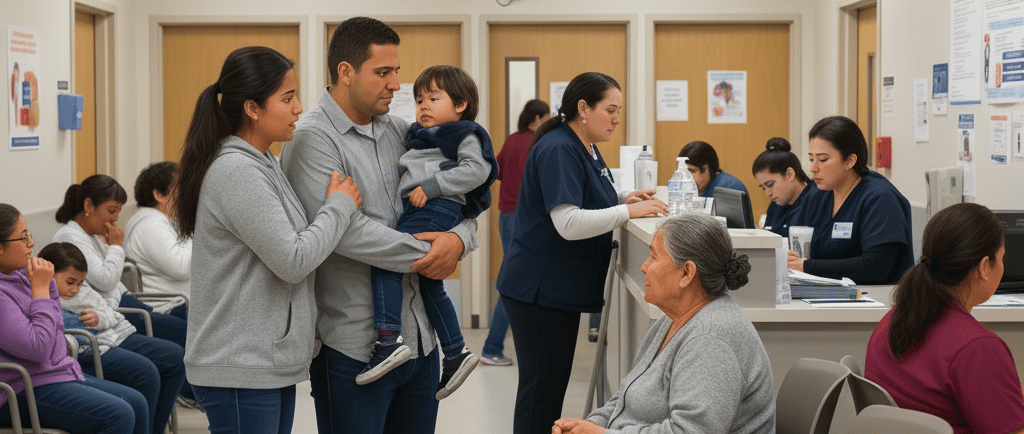Welcome to Noodles of Asia ! - A Woke Noodle Blog
Clearing the Broth: Do Undocumented Immigrants Get Health Insurance and Free Medical Care?
Unravel the facts on undocumented immigrants and healthcare at NoodlesOfAsia.com—clarifying insurance, care access, and taxpayer impact. Join #NoodlesForAll for equitable solutions.
Woke Noodles - Noodles of Asia
10/5/20254 min read


At NoodlesOfAsia.com, we see the ramen noodle as a symbol of straightforward access—a low-cost essential that anyone can afford, providing essential nourishment without hidden costs or eligibility hurdles. It's the great equalizer in the kitchen, reminding us that basic care should be available to all, regardless of status. In the heated debates of American politics, myths about undocumented immigrants "draining" healthcare systems persist, often fueled by misinformation during election cycles or shutdown standoffs. Do they get health insurance or free medical care? The short answer: No, undocumented immigrants are largely ineligible for federal health programs, paying out-of-pocket or relying on limited emergency services. This post clarifies the facts, explores how they access care and its limitations, examines the taxpayer impact, and highlights available programs—because when the pot of truth is clear, we can focus on real solutions like expanding access for everyone.
The Reality: No Federal Health Insurance for Undocumented Immigrants
Undocumented immigrants—estimated at 11 million in the U.S.—are explicitly barred from most federal health insurance programs. This includes Medicaid, Medicare, the Children's Health Insurance Program (CHIP), and Affordable Care Act (ACA) Marketplace subsidies or plans. The 1996 Personal Responsibility and Work Opportunity Reconciliation Act (PRWORA) made them ineligible for non-emergency federal benefits, a policy reaffirmed in subsequent laws. Undocumented individuals cannot buy unsubsidized Marketplace coverage either; they must pay full price if eligible for any private plan, which is rare and unaffordable for most.
"Free medical care" is another myth. There's no blanket program providing comprehensive, cost-free treatment. Claims during the 2025 shutdown that Democrats pushed "free healthcare for illegals" were debunked—the proposals protected ACA for citizens and legal residents, not undocumented folks. Undocumented immigrants contribute to the system via payroll taxes—$12 billion annually to Medicare and Medicaid—without drawing benefits, creating a net surplus.
How Undocumented Immigrants Access Medical Care—and the Limitations
Without federal insurance, undocumented immigrants turn to a patchwork of options, often at great personal cost. Emergency care is the cornerstone: The Emergency Medical Treatment and Labor Act (EMTALA) requires hospitals to stabilize anyone in a life-threatening emergency, regardless of ability to pay. This covers acute issues like childbirth or heart attacks, reimbursed via limited Emergency Medicaid—federal funds for hospitals treating undocumented patients, not direct benefits to individuals. However, it's restricted to "emergencies," excluding routine care like check-ups or chronic disease management.
For non-emergencies, options are sparse and state-dependent. About 14 states and D.C. use state-only funds to provide Medicaid-like coverage to undocumented children and pregnant women, covering prenatal care and pediatric services. California’s Medi-Cal, for example, extends full benefits to undocumented kids under 19, while New York covers all low-income undocumented residents. Adults face bigger hurdles: Only a handful of states like Oregon and Washington offer limited adult coverage, often capped at primary care. Community health centers (CHCs)—federally qualified but open to all—provide sliding-scale services, treating 1.5 million undocumented patients yearly, but long waits and limited slots are common.
Limitations are stark: No preventive care means untreated conditions worsen into emergencies, driving up costs—undocumented immigrants use 50% less healthcare than citizens due to fear and barriers. Language barriers, deportation fears, and lack of transportation exacerbate gaps, with 40% of undocumented adults uninsured vs. 8% of citizens. Charity care from hospitals fills some voids, but it's inconsistent and overburdened.
The Taxpayer Impact: Contributions Outweigh Costs
The narrative of undocumented immigrants "draining" taxpayers is overstated. They pay $13 billion annually in state and local taxes, including $7 billion to healthcare programs they can't access. Emergency Medicaid costs taxpayers $2 billion yearly—about 0.4% of total Medicaid spending—but this reimburses hospitals for mandated care, preventing broader system collapse. KFF estimates undocumented immigrants' net fiscal impact on healthcare is minimal or positive, as they use fewer services (due to barriers) and contribute via taxes. A 2024 CBO analysis found immigration adds $7 trillion to GDP over decades, offsetting costs through labor and consumption.
Critics like the House Budget Committee claim $162 billion in Medicaid costs from undocumented immigrants under Biden, but this inflates emergency figures and ignores contributions. Fact-checks from NILC show such claims misrepresent data—undocumented folks are ineligible for full benefits, so costs are limited to emergencies. Overall, their healthcare footprint is small—1% of uncompensated care—compared to $45 billion in total uncompensated care annually.
Available Programs: A Patchwork of Support
While federal options are off-limits, state and community programs provide lifelines:
State-Funded Medicaid: 14 states (e.g., California, Illinois, New York) cover undocumented children and pregnant women with full benefits, including prenatal and pediatric care. California’s Medi-Cal serves 1 million undocumented kids; New York's Essential Plan extends to low-income adults in some cases.
Emergency Medicaid: Covers acute care like labor/delivery or organ transplants, reimbursing providers—not individuals. Limitations: No follow-up or preventive services.
Community Health Centers (CHCs): 1,400+ centers offer sliding-scale care to 30 million annually, including undocumented patients. Federally funded but open to all, they provide primary care, dental, and mental health.
Charity and Safety-Net Programs: Hospitals offer charity care ($45B/year total), and nonprofits like Planned Parenthood provide low-cost services. Some states like Oregon cover all undocumented adults via expansions.
Expansion varies: Blue states lead (e.g., Washington's $700M for immigrant health), red states lag. Advocates push for universal coverage, but barriers persist.
Simmering Toward Solutions: A Call for Equitable Access
The myth of "free care" for undocumented immigrants distracts from real issues: 28 million uninsured Americans overall, including citizens. Their contributions—$13B in taxes—subsidize the system without reciprocity, a net positive per KFF. Solutions? Expand state programs, fund CHCs ($10B boost needed), and pursue universal coverage—Medicare for All could save $500B/year by reducing administrative waste.
At NoodlesOfAsia.com, host "access noodle nights": Discuss equity over bowls, sticker #NoodlesForAll on petitions for coverage. Truth clears the broth—let’s fill it for everyone.
What’s your view on healthcare access? Share below.
